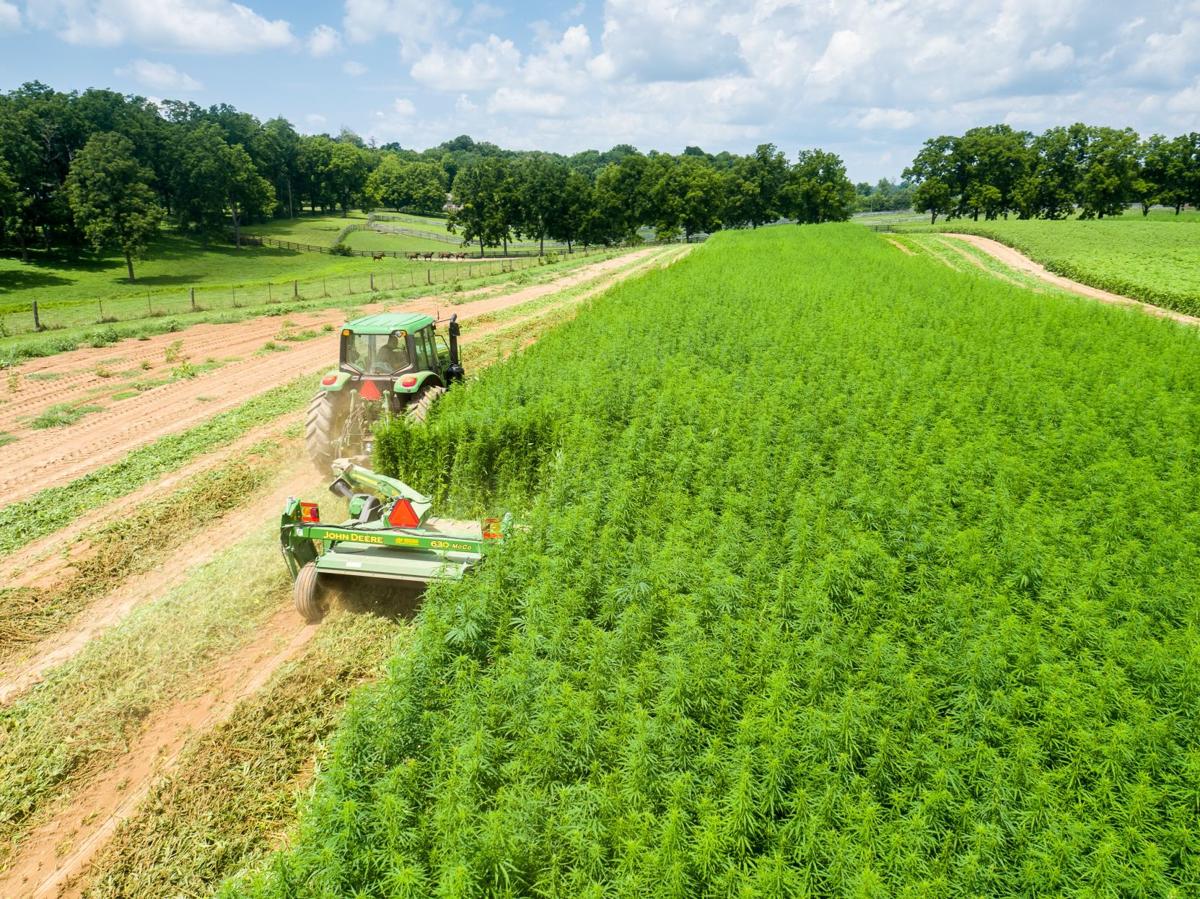Farm to Fork Column
By: Victor Martino
 Will industrial hemp be California’s next major cash crop?
Will industrial hemp be California’s next major cash crop?
Industrial hemp, which unlike it’s cousin marijuana contains a negligible amount of THC, the compound that gets you high, may soon be given the green light as a fully-legal commercial crop in California.
Industrial hemp cultivation is currently highly-restricted in the Golden State, where ironically it’s relative marijuana is legal for recreational use.
In order to cultivate industrial hemp in California a grower must be affilliated with an agricultural research institution approved by the state.
Existing California law defines industrial hemp as a fiber or oilseed crop, or both, that is limited to the non-psychoactive types of the plant Cannabis sativa L and the seed produced from the plant.
California also requires that industrial hemp only be produced by growers who are on a special list of state-approved hemp seed cultivators. It can be grown by these research institute-affiliated farmers as only a densely planted fiber or as an oilseed crop.
This could all change soon though if either of two pieces of pending legislation, SB 1409 on the state level, and the federal Farm Bill, pass and become law.
SB 1409, which recently passed out of committee in the California State Senate, would eliminate the exclusionary requirement that industrial hemp be grown only as a fiber or oilseed crop, or both.
However, it’s unclear whether the legislation if passed will allow growers to harvest industrial hemp for CBD (Cannabidiol) derivation. CBD-infused products – foods, drinks and oils, for example – for medicinal and recreational use is a booming market in the U.S.
SB 1409 could be irrelevant though if the 2018 Farm Bill is passed with a provision to legalize industrial hemp sponsored by Senate Majority Leader Mitch McConnell (R-Kentucky) remains intact.
The legislation, (S. 2667) is co-sponsored by a bipartisan coalition of more than two-dozen Senators, including Senate Minority Leader Chuck Schumer (D-New York.) With the two leaders co-sponsoring the legislation the odds are it will pass.
The U.S. banking and private investment sectors also support the legalization of industrial hemp cultivation, which adds two very powerful forces to passage of the legislation.
Basically the legislation will make it legal to grow industrial hemp in the U.S. for most uses, including CBD extraction, just like it was legal in the days of our founding fathers. Thomas Jefferson, for example, cultivated industrial hemp and sang its praises for a myriad of uses, from rope to paper.
The legislation allows states to regulate industrial hemp cultivation. But it’s hard to imagine California not allowing it since there are already 39 states, including neighboring Colorado and Washington State, which have legalized hemp-growing for all common uses.
The 19 leading U.S. hemp-growing states planted 25,712 acres of industrial hemp in 2017, according to government and private industry statistics, which is up from 9,770 acres in 2016. California, the leading farm state in the nation, isn’t on the radar in terms of the number of acres in cultivation
The market for industrial hemp is booming. CBD, which is extracted from hemp at lower levels than from marijuana, is the number one profit generator to date. But other areas are growing fast as well, including bio-composites and building materials made from hemp, food and beverage products – hemp milk has been on the market for over a decade, for example – protein feed for animals, high omega oils and nutritional supplements, to name only a few.
Industrial hemp can be cultivated in various regions in California, including but not exclusively in the Central Valley and the high-desert region.
Hemp cultivation could be a boon to farmers in the state’s high desert region because few crops are able to be grown there. In fact, agriculture researchers at the University of California, Riverside announced in September they plan on planting a test crop in the high-desert region in order to test how industrial hemp performs there.
There’s no logical reason for California to continue to prohibit the cultivation of industrial hemp for all known current uses.
In fact, it’s prohibition might be the only case in which the state’s Democratic Party-controlled government is behind the thinking of the conservative Republican Senator from Kentucky (where hemp cultivation is legal), Mitch McConnell.
A FEW HOT ITEMS — FROM THE FARM TO THE FORK
No Labor-Shortage Relief For California Farmers This Year: My sources in Washington D.C. say not to expect any sort of immigration reform legislation to be passed in 2018, particularly since the 2018 midterm election is coming up in November.
Instead they tell me the election might just decide if immigration reform happens in 2019. If the Democrats take back both the House and Senate in the November 2018 midterms, it might open up the door for moderate Republicans who want immigration reform to form a coalition with Democrats to get something passed. But any immigration reform bill has to be signed by President Trump, so uncertainty remains the rule of the day.
Meanwhile, California farmers are reporting record labor shortages on the farm. Don’t be surprised if farmers in California, who generally vote Republican, vote for some Democrats in November as a way to up the odds of immigration reform legislation being passed in 2019. Stay tuned.
California-Grown Cauliflower Is The New Kale: Restaurants throughout the country are using California-grown cauliflower in ways previously not heard of. The latest hot menu items featuring cauliflower include cauliflower steaks – thick slabs of the vegetable prepared to resemble a beef steak – and breaded “cauliflower buffalo wings,” the veggie version of popular chicken wings. There’s also artisan pizzas with crusts made from cauliflower, which is a particular favorite of those people who avoid gluten. Cauliflower rice is another hot dish, and not just for the gluten-avoidance sect. It’s tasty and is gaining a widespread following among eaters.
Is cauliflower popular? You bet it is. According to the US Department of Agriculture’s Economic Research Service, the per capita consumption of fresh cauliflower in the U.S. was estimated to be 2.18 pounds in 2017, which is a 61 percent increase from the 1.57 pounds in 2016. Market research from Nielsen also showed that sales of products that contain cauliflower also rose by 71 percent in value in the previous year.
The growth of cauliflower consumption comes as good news for California growers, as the state is responsible for approximately 90 percent of all production. The increase in demand naturally resulted in the growth of the overall industry as well. Planted California acreage has experienced an increase over the past three years with 37,800 acres planted in 2017. Production also grew significantly in 2017 to nearly 415 thousand tons. The overall value of California cauliflower production in 2017 was close to $83 million. That’s some serious growth.
California Pistachios: A Trade War Casualty: Three years ago California pistachios fetched on average $3.77 a pound. This year the price is expected to be around $1.80, according to pioneering California pistachio grower Lawrence Easterling. Easterling told the Wall Street Journal in a September 19 piece that the $1.80 will barely allow him and other pistachio growers in the Golden State to break even this year. The pistachio harvest is in early fall.
There’s no end in site for the President’s trade wars, which include China, the European Union, Mexico, Canada and Turkey. California farmers, particularly those who grow a significant portion of crops for export, are very concerned about the President’s ongoing trade wars. It’s just another difficult issue to deal with as we enter fall. Water, labor shortages, trade wars.
The challenges keep piling up for farmers in the Golden State. It’s a good thing they’re among the most resilient business people around.

By Victor Martino

